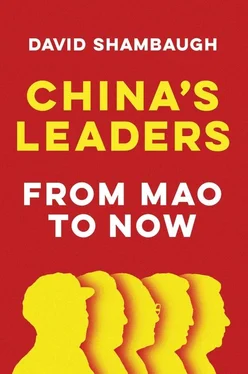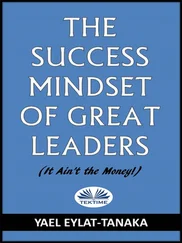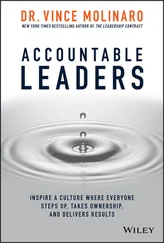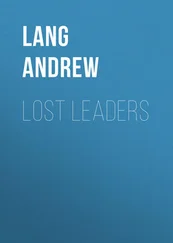They have certainly shown commonalities as well. As with all Chinese leaders since the “self-strengtheners” of the late Qing dynasty (1870s–1890s), they sought to build China economically, make it “wealthy and powerful” (富强), to maintain its territorial integrity and sovereignty, to protect its national security, to recover its lost dignity and respect, and to strengthen the country’s position in Asia and the world. 1All also sought to continually strengthen the Chinese Communist Party institutionally (Mao and the Cultural Revolution being the major exception, although it can be argued that Mao too was trying to remake and thus reinvigorate the Party). As leaders of “new (socialist) China” (post-1949) they had the common vision of reducing poverty and social inequalities, increasing literacy and education, reducing the rural–urban gap, eliminating social vices, and maintaining social stability (the Cultural Revolution again being the exception). Yet the means and approaches for achieving many of these goals varied considerably among the five leaders. Thus, when conceptualizing the similarities and differences among these five leaders it may be analogous to think of a house or building where the foundation, walls, and roof remain the same—but the interior rooms and wiring were constantly being altered.
Perspectives on Leadership
It is also useful to view Chinese leaders through different prisms and paradigms that have been developed to analyze leadership and authority. When doing so, we also see differences. Max Weber famously distinguished between three types of political authority: charismatic, traditional , and legal-rational . 2By Weber’s criteria, all five leaders exhibited elements of each. All five were “traditional” in that they operated in—and continued—the patrimonial male-dominant, hierarchical political system that had characterized China since its inception. All five (to differing extents) were “legal-rational” in that they all were comfortable with and sought to build strong institutional hierarchies to administer both the state and society, and the decision bases for policy were taken more or less rationally and meritocratically within these institutions. Mao’s post-1966 attack on bureaucracy could also be interpreted as a deviation—but, again, he was trying to remold the bureaucracy, not destroy it altogether. Mao was not an anarchist. Concerning Weber’s third type of leadership, only Mao and Xi can be said to have been “charismatic” leaders—motivating the masses through personal populist appeal—the other three (including Deng) were not. Jiang Zemin was certainly extroverted and gregarious, but that is not the same as being charismatic.
Another popular paradigm is of “transformational” versus “transactional” leadership, as famously put forth by the American political scientist James MacGregor Burns in his classic book Leadership . 3Transformational leaders, Burns argued, seek to transform society through ideas; they are generally intellectuals who pursue an ideological agenda. Three of our five Chinese leaders—Mao, Deng, and Xi—can be said to have been the former, as they all truly had a qualitatively transformative impact on society and institutions. Burns also defined four specific sub-categories of transformational leaders, into which I would place each leader: ideational leaders (Mao, Deng, Xi), reform leaders (Deng, Xi), revolutionary leaders (Mao), heroes (Mao), and ideologues (Mao, Xi). He also noted that transformational leaders “recognize and exploit an existing need or demand of a potential follower.” 4In this regard as well, Mao, Deng, and Xi all tapped into popular needs of the mass public—all three through deep nationalist yearnings as well as preference for “strongman” leaders, Mao through the appeal of egalitarian socialism, Deng through the opportunity of economic empowerment, and Xi through a preference for social order and crackdown on privileged corruption. Jiang and Hu were transactional leaders, “exchanging” the right to rule for incremental improvements in people’s lives and patronage of specific bureaucracies (what Burns described as “bargains with bureaucrats”). Jiang and Hu also acted more in what Burns describes as a “managerial style” (similar to a corporate boss), and were “consensus builders” rather than transformative proactive leaders. Jiang and Hu were also the most comfortable of the five operating within “groups” and “collective” leadership, both typical of the transactional style of leadership.
The academic field of “leadership studies” in the United States has burgeoned since the 1960s and has produced a vast literature as well as dedicated leadership schools on university campuses. One leading scholar of leadership (and practicing psychologist), Daniel Goleman, who is known particularly for his pioneering work on emotional intelligence, has identified six distinct leadership styles: coercive (demands immediate compliance), authoritative (mobilizes people toward a vision), affiliative (builds personal relationships with colleagues), democratic (forges consensus through participation), pacesetting (sets high standards for performance), and coaching (develops successors for the future). 5Mao, Deng, and Xi distinctly exhibited coercive tendencies. Mao and Xi, to a lesser extent Deng, were authoritative. Deng, Jiang, and Hu were affiliative. Deng, Jiang, and Hu were democratic. Deng, Jiang, Hu, and Xi were all pacesetters. Only Mao and Deng can be said to have been concerned with fostering (coaching) their successors.
Of course, leadership is also very culturally and system dependent. 6Leaders who would succeed in Europe would not likely succeed in the Middle East, for example, and those who are successful in autocratic systems are not appropriate for democratic systems (and vice versa). Nonetheless, it is interesting to consider leadership skills comparatively, as certain ones do transcend different political systems. Take, for example, the seven core leadership qualities identified by the American politics scholar Fred Greenstein for successful American presidents: vision, political skill, organizational capacity, public communicator, cognitive style (how a leader acquires and processes information), emotional intelligence, and moral character. 7If we were to apply these to China’s leaders, I would judge that Mao, Deng, and Xi all possessed vision. Mao, Deng, Jiang, and Xi all possessed political skill (defined by Greenstein as being motivational and able to forge political coalitions). Deng, Jiang, and Xi all excelled at organizational capacity. Mao and Deng were poor public speakers, while both Jiang and Hu were rather robotic in their public presentations (Jiang was just the opposite in private). Only Xi was a good public communicator. Each had their own distinct cognitive style of processing information. So-called emotional intelligence—the ability to read and channel others’ emotional needs—is a key ingredient noted in many studies of leadership, as it naturally creates “followership.” The best leaders inspire and incentivize followers, and thus do not need to rely on other forms of inducement. I would say that only Mao and Xi, among our five leaders, possessed this skill. Finally, what about moral character? Here, all five strike out if measured by the repressive system they presided over and the personal use of arbitrary power each wielded. But, if measured on the basis of the behavioral type of Chinese Communist Party members and society’s citizens that each sought to foster—then we can say that all five advocated policies encouraging honesty, clean living, noncorruption, frugality, and other traditional communist values. There has been an additional expectation that China’s leaders should embody the traditional Confucian archetype of the caring, benevolent, and patriarchal figure (all five fit this paradigm).
Читать дальше










